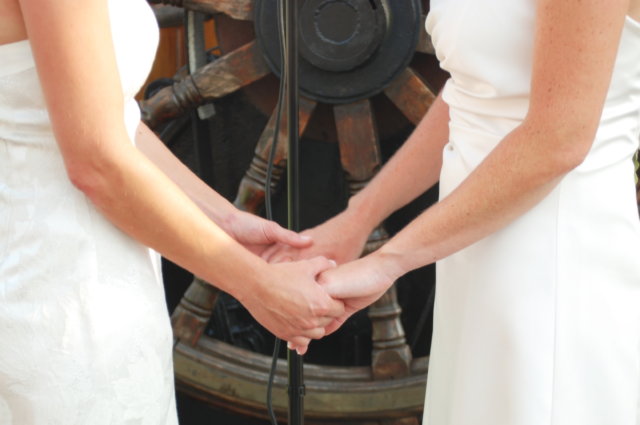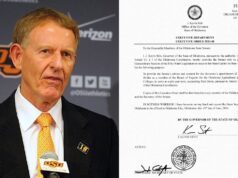
Now that the Supreme Court has expressly ruled that a gay couple has a fundamental right to marry, those opposing such marriages are doing whatever is possible to keep such couples as second-class citizens. As is nearly always the case, religious belief is being used as the excuse to discriminate.
The latest example is Sen. Greg Treat (R-OKC) and Rep. Travis Dunlap’s (R-Bartlesville) SB 1140, which would exempt private child-placing agencies from participating in adoption and foster-care child placements that violate “the agency’s written or moral convictions or policies.” (Earlier in March, it passed the full Senate 35-9, and it now awaits potential review after being assigned to the House Judiciary Committee.)
Oklahoma’s Catholic Archbishop and Oklahoma Southern Baptist leaders have joined together to support the legislative proposal. In a story appearing in our largest metropolitan newspaper, the executive director of the Baptist General Convention of Oklahoma said his organization has been “… outraged to learn of threats to the religious liberty and moral convictions of faith-based agencies in other parts of the country …”. Newspaper accounts make clear that the unspoken goal of SB 1140 is to impede the ability of gay married couples to adopt or become foster parents.
Scientific research supports same-sex adoption
Oklahoma’s adoption and foster-care adoption laws are intended to have a single focus: the well-being of the child — not the religious views of those involved in the placement process. Private agencies enter into contracts with the state to screen couples who can capably provide a child with love, shelter, support and a safe environment. Taxpayer dollars support this process. There are no religious tests for otherwise qualifying couples.
Decades of social science research has conclusively shown that the well-being of a child in a home with same-sex parents does not suffer. In the marriage equality litigation, the conclusion of the amicus brief filed by the American Sociological Association was unambiguous, stating: “The social science consensus is both conclusive and clear: children fare just as well when they are raised by same-sex parents as when they are raised by opposite-sex parents.” The amicus brief of the American Psychological Association agreed.
These religious supporters of SB 1140 were also vigorous opponents of marriage equality, showing little concern about the daily humiliation and embarrassment being endured by the thousands of children being raised by same-sex couples — and the daily stigma these children carried among their classmates and friends — because it was illegal for their parents to get married. The opinions of the sociologists and psychologists about the well-being of the child held little sway. Religious belief trumped such concerns.
The real questions that should be asked
Since 2014, national polls have shown that a majority of Americans support adoption by gay parents. The real “religious freedom” questions that should be asked are these:
- Why should the religious views of any agency contracting with the state (and involving taxpayer dollars) be imposed on a social services system operated pursuant to the state’s civil laws?
- What “state” interest is there in allowing any organization’s decision-makers to disqualify applicants based on a religious-belief test?
- How is the well-being of a child being served by such a test?
- And finally, who is next in this unending drama of seeking to put narrow Christian beliefs into Oklahoma’s social services systems?
Discrimination persists despite other options
Under the language of SB 1140, faith-based decision makers could decide to screen out all nonbelievers, or non-Christians, or couples in an interfaith marriage, or even a couple where one of the two persons (or both) have been previously divorced (after all, Jesus clearly condemned divorce). SB 1140 leaves all these possibilities wide open if the placement agency’s decision makers have religious or moral convictions against such couples.
The authors of SB 1140 (embedded in full below) and the complaining religious leaders try to soften the impact of what they seek by saying that other agencies already exist that are willing to place children in “nontraditional families.” We’ve heard that before. Some of us are old enough to remember signs in windows refusing service. Telling citizens there is someplace else to go does not lessen discrimination.
